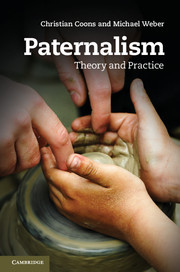Book contents
- Frontmatter
- Contents
- Contributors
- Introduction Paternalism – Issues and trends
- Chapter 1 Defining paternalism
- Chapter 2 Penal paternalism
- Chapter 3 Self-sovereignty and paternalism
- Chapter 4 The right to autonomy and the justification of hard paternalism
- Chapter 5 Moral environmentalism
- Chapter 6 Kantian paternalism and suicide intervention
- Chapter 7 Paternalism and the principle of fairness
- Chapter 8 Paternalism in economics
- Chapter 9 Choice Architecture: A mechanism for improving decisions while preserving liberty?
- Chapter 10 A psychological defense of paternalism
- Chapter 11 Libertarian paternalism, utilitarianism, and justice
- Chapter 12 Voluntary enslavement
- Chapter 13 Paternalism, (school) choice, and opportunity
- Bibliography
- Index
Chapter 4 - The right to autonomy and the justification of hard paternalism
Published online by Cambridge University Press: 05 February 2013
- Frontmatter
- Contents
- Contributors
- Introduction Paternalism – Issues and trends
- Chapter 1 Defining paternalism
- Chapter 2 Penal paternalism
- Chapter 3 Self-sovereignty and paternalism
- Chapter 4 The right to autonomy and the justification of hard paternalism
- Chapter 5 Moral environmentalism
- Chapter 6 Kantian paternalism and suicide intervention
- Chapter 7 Paternalism and the principle of fairness
- Chapter 8 Paternalism in economics
- Chapter 9 Choice Architecture: A mechanism for improving decisions while preserving liberty?
- Chapter 10 A psychological defense of paternalism
- Chapter 11 Libertarian paternalism, utilitarianism, and justice
- Chapter 12 Voluntary enslavement
- Chapter 13 Paternalism, (school) choice, and opportunity
- Bibliography
- Index
Summary
Principled anti-paternalism comes in different forms. One alleges that interference with the choices of well-informed, competent adults cannot benefit them because each is the best judge of where his self-interest lies. This “best judge” principle is usually defended on the grounds that a preferentist account of prudential value is true and each knows his own preferences better than anyone else does. A second form of anti-paternalism alleges that even if the paternalist knows what’s best for you, being forced to conform to his judgment is a harm that outweighs any benefit derived from voluntarily conforming to it. This view implies that all coercive paternalism is necessarily self-defeating, while the first implies that any attempt even to persuade another well-informed adult that his choice is foolish, because its aim is foolish, is misguided. Both rest on dubious assumptions about what well-being is. For this reason a third form of principled anti-paternalism may seem more promising. It grants that some coercive paternalistic interference may leave its target better off but insists that it remains wrong because it violates a right to personal autonomy or “sovereignty.” Not all paternalism is supposed to violate this right; “soft” paternalism is not. But many liberal theorists – the most prominent and influential of whom is Joel Feinberg – hold that any paternalism that does violate it (i.e., any “hard” paternalism) is wrong because the right in question is absolute.
This paper critically examines some different views about the content, strength, and justification of a right to autonomy. The first section explains some background assumptions I make about the right to autonomy, the concept of paternalism, and the soft/hard distinction. The second section contrasts choice- and preference-based accounts of the right and defends a “hybrid” account that combines features of both. In the third section I distinguish three respects in which the right might be thought absolute, and I argue that a right that is absolute in the way Feinberg supposes – vis-à-vis interferences aimed at increasing one’s own welfare or autonomy – will be quite implausible unless some limits are imposed on its scope. I note some possible limits but find that it is unclear whether they are justifiable on the basis of the Kantian moral theory usually invoked to justify a right to autonomy. The fourth and final section offers some reasons why we should reject a right that’s absolute.
Keywords
- Type
- Chapter
- Information
- PaternalismTheory and Practice, pp. 74 - 92Publisher: Cambridge University PressPrint publication year: 2013
- 9
- Cited by

